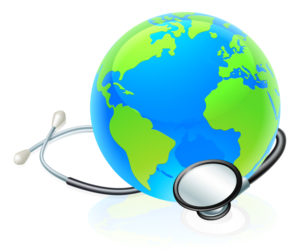
There has never been a brighter spotlight on the subject of climate change, and the threat it poses to the world. Yet as more and more people are educated about what this will do to our weather, storms, agriculture, and even national security, the consequences on one other aspect of life must not be overlooked: healthcare. Climate change’s impact on our health is a looming specter that is already taking its toll.
That impact comes in both direct and indirect ways. From a direct perspective, a changing climate—as well as the pollution that is a major cause of it—can exacerbate serious respiratory conditions that threaten thousands of people every year. It can and will create more negative health outcomes as it restricts peoples’ access to the basic necessities of clean air and drinking water, healthy food, and sufficient shelter. The World Health Organization estimates that between 2030 and 2050, as many as 250,000 people could die each year from conditions created by a lack of these necessities, including malnutrition, malaria, and heat stress.
Climate change will also have an indirect negative impact on healthcare because of disruptions to healthcare process. Worsening storms and other weather events cause damage to the infrastructure of healthcare, making it more difficult for ambulances to travel. Hospitals with vital equipment will become more susceptible to power outages. Areas with weaker health infrastructures—such as rural and some mountainous regions—will find it more difficult to successfully provide services to patients. Mortality rates will rise as more people perish during increasingly destructive natural disasters.
But even as climate change will make healthcare worse, fighting it could also make healthcare better. Many of the policies that will alleviate the pace and effects of climate change will also improve human health. Switching from oil and gas to renewable forms of green energy that reduce pollutants in the air will help alleviate respiratory illnesses. Converting existing energy systems to meet better environmental standards will in many cases increase their efficiency and stability, reducing the risks of blackouts in medical facilities caring for patients.
As climate change gets worse—and it will, before it gets better—so will the challenges facing healthcare. But as we fight to save the environment and ourselves, we will be able to improve health outcomes and the healthcare system as well. All the more reason to keep fighting the good fight.
You can learn more about climate change, healthcare, and other policy issues in the upcoming book, Magenta Nation, written by Joy Scott.
If you’re in healthcare, insurance, technology or other professional services industries, and need help with a PR, marketing or social media campaign, contact Scott Public Relations.
Download our e-book, “The C-Suite Asks, We Answer: The Top 6 Questions About Healthcare PR.”

Learn more about healthcare PR, insurance PR, and technology PR in Scott PR’s Einsight blog, and follow Scott Public Relations on LinkedIn, Twitter, and Facebook
Sign up to receive our monthly advice on healthcare, insurance and technology PR: Scott Public Relations.





Leave A Comment